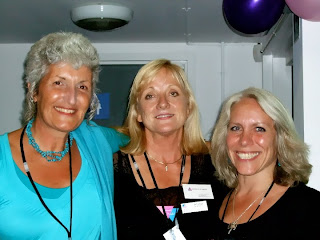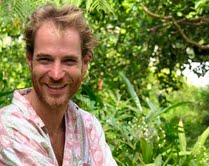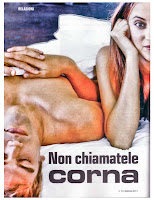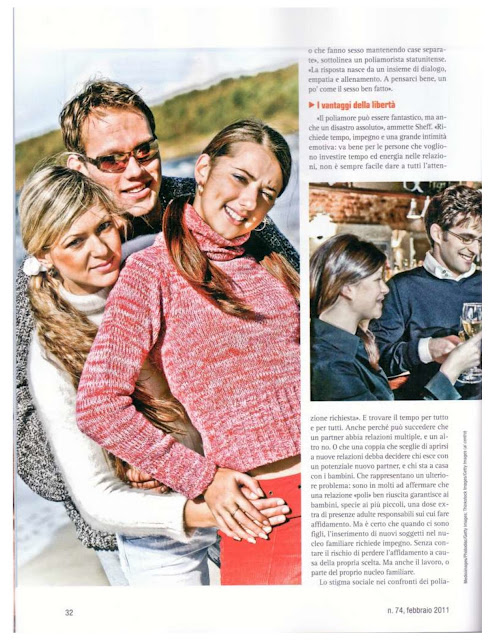"Bisexuality, Gaia, Eros: Portals to the Arts of Loving"
BiReCon: Selected Proceedings from the 2010 Int'l Bisexual Research Conference
Serena Anderlini-D'Onofrio, PhD, Keynote Speaker
Conclusion: “Getting Bi” in a Very Gaian Way
If bisexuality is an unfinished project, BiReCon and this volume could be the sparkle that reignites. My contribution gestures toward a way of being bi that is more natural and more artistic too. As a social construct, “sexuality” seems to dominate whenever love is seen as a need or instinct. In an erotic context, those same needs register as talents, the raw materials upon which a good education in the arts of love can build. That’s why in common parlance “bi” is often used, with the suffix “sexual” omitted, as in Robyn Ochs’s Getting Bi. Bisexuality has secured a place in the LGBTQ acronym, it is even poised to become an equally protected category in the marriage equality disputes at some point in the future. But its complexity is far from being understood. More education in the arts of loving is needed, with the special talents bisexuals offer featured prominently in the curriculum. Only education and access to knowledge can dispel myths, and the good news is that education in the arts of loving is good for the third planet Earth too.
In the ways of a report on the “war” we humans wage on this gracious hostess, it would appear that Gaia is at the moment not very happy with us. At the very least, we are a mixed blessing for the “gay” planet. She must have the impression that we humans are an abusive species that takes the lion’s share and does not respect the environment well enough. Can we get Gaia to change her mind? As a portal to a world without the homo/hetero divide, bisexuality allows us to imagine a planet where the erotic energy that makes Gaia alive is not blocked by socially constructed binaries. This world puts the politics of love center stage because it loves Eros: it is erotophile. Dominating is a lot of work. To simply “get bi” is a lot more fun. Wouldn’t this be a shift in paradigms? It would open up a future where Gaia is recognized as a “gay” planet. As a way to bode well for this future, let me anticipate two possible transformative constructs: Organic bisexuality and holistic sexual health.
Sex educators Kamala Devi and Reid Mihalko advise against judging relationships from longevity (2010). Quality is what counts. Organicity. Relationships, says progressive counselor Daphne Kingma, have a natural way of coming apart, or transmuting, when their developmental task is complete (2000). In this context, “organic bisexuality” seems a highly sustainable orientation that bodes well for the future. It can sustain the fluidity of a person’s lifetime as an erotic being. It can enhance the erotic virtues of bisexual versatility while our species transitions to a culture beyond “sexuality,” where the arts of loving are revered.
As a form of sexual fluidity, organic bisexuality is also part of a more natural way to be amorous and erotically inclusive. It’s a Gaian way of getting bi, as bisexual advocate and author Robyn Ochs would most likely put it. This way honors the origins of our species in our four-billion years old ancestors, bacteria, whose orgiastic sex lives allowed life to begin. The origin of sex is in the symbiosis of bacteria. Allowing the energy of love to circulate is what infuses matter with life today too. As we transition to a Gaian paradigm, we learn to honor the gayness of our species. We choose to love the only planet willing to have us over. And we become more aware of our bodies as ecosystems. As a web of life, Gaia is made of symbiotic ecosystems. Each and every one of us is also one such smaller combination of symbiotic beings. For example, the friendly bacteria in our digestive tracts are symbionts without which we could not be alive.
Our orgiastic yet completely innocent ancestors have been welcome on our hostess planet for four billion years. We have been so abusive in our short shrift of about one million years (and the past three millennia in particular), that human-made climate change and other cataclysms could soon turn most of us in homeless climate refugees. Could this be because we need to be more in tune with sexual fluidity? Perhaps we should consider learning something from bacteria. That’s where a holistic notion of sexual health comes in. As a way to develop the arts of loving that sustain our ecosystems, we need to manifest ecological styles of love that sustain the vitality of the amorous networks where these arts are taught and practiced profusely.
So my recommendation for the project of bisexuality to sparkle anew is that we would do well to learn from our older progenitors and celebrate their orgiastic fluidity, their bisexual equal opportunism as the cure that will heal our species and end its unwinnable war against our
hostess planet. Identity seems to be a condition for inclusion, and yet, as a basis for coalition it is tricky. Women have had the vote for almost a century now in countries that lead the industrial revolution. And what does the scene of politics look like? Has love come to a center stage position? Where identity fails, vision often succeeds.
In a famous article of 2000, legal scholar Kenji Yoshino lamented the “epistemic contract of bisexual erasure” by which both straights and gays tacitly agree to suppress bisexuality from legal and cultural discourse. His point is well taken, and unfortunately, he found abundant evidence to prove it. Yet to be proven wrong is all he wished. Can we do it? Ultimately, who stands to gain from constructing bisexuals as the new bête noire of the sexual liberation movement? And why does such a movement need scapegoats to begin with? Associating bisexuals with predators, the hypersexed, the unredeemable only helps to fuel the flames of fundamentalist erotophobic leaders and the crowds who follow them, partly out of new forms of ignorance that have arisen from the privatization of knowledge and widespread corruption in the seats of power and the media. When public education becomes a priority over the war machine, the arts of loving that bis specialize in will be redeemed. They will be taught in schools!
When bisexuality breaks the sound wall and opens up that portal to a world without the hetero/homo divide, a scene of world politics without binaries will emerge. Forces will coalesce to share resources of love more generously and efficiently, and to break down the fears that separate individuals from one another and make them sick and miserable. As an educator, I’ve had the privilege of doing research and scholarship about bisexuality in the past thirteen years under the aegis of a public institution of higher education, the University of Puerto Rico, with the added bonus of integrating this research into my undergraduate teaching. The complete academic freedom, or libertad de cátedra, I have experienced is also significant. I send my wish into the future. May more knowledge about bisexuality manifest and more research into its complexities, possibilities, and virtues come to fruition.
Bi portals open vistas on a future where the arts of love redeem our species. We’re at war against Gaia and cannot win! Why don’t we try to make peace? With Robyn Ochs and others a BiReCon I cast my vision for a way of “getting bi” around the globe that is very Gaian indeed.
May BiReCon be just the beginning!
Works Cited and Consulted
Anderlini-D’Onofrio, Serena. Gaia and the New Politics of Love: Notes for a Poly Planet. Berkeley: North Atlantic Books, 2009.
Barash, David, and Judith Eve Lipton. The Myth of Monogamy. New York: Holt 2001.
Ben-Ze’ev, Aaron. Love Online: Emotions on the Internet. Cambridge University Press, 2004.
Consiglio, Carlo. L’amore con più partner. Rome: Pioda, 2009.
Corrigan, Annie. “Dan Savage Interview, Part 3: It’s Not Easy Being Non-Monogamous.” Kinsey Confidential, Dec 24, 2010. http://kinseyconfidential.org/dan-savage-3-non-monogamous/
Devi, Kamala and Reid Mihalko. Ethics for Non-Monogamous Ninjas. N.P.: Createspace, 2010.
Diamond, Lisa. Sexual Fluidity: Understanding Women’s Love and Desire. Harvard University Press, 2008.
Druckerman, Pamela. Lust in Translation: Infidelity from Tokyo to Tennessee. New York: Penguin, 2007.
Dworkin, Sari. “Biracial, Bicultural, Bisexual: Bisexuality and Multiple Identities.” Journal of Bisexuality: 2: 4 (2002): 93-108.
Fahs, Brianna. “Compulsory Bisexuality?: The Challenges of Modern Sexual Fluidity.” Journal of Bisexuality: 9: 3-4 (July-December 2009): 431-450.
Fromm, Erich. The Art of Loving. Marion Hausner Pauck tr. New York: Harper, 2006. (First published in 1956.)
Gimbutas, Marija. The Language of the Goddess: Unearthing the Hidden Symbols of Western Civilization. San Francisco: Thames and Hudson, 1989.
______ . The Living Goddesses. Berkeley, CA: University of California Press, 2001.
Kingma, Daphne. Coming Apart. Newburyport, MA: Conari Press, 2000.
Klein, Marty. America’s War on Sex: The Attack on Law, Lust, and Liberty. Westport, Connecticut: Praeger, 2006.
Hutchins, Loraine, and Lani Kaahumanu eds. Bi Any Other Name: Bisexual People Speak Out. Boston: Alyson, 1991.
Ince, John. The Politics of Lust. New York: Prometheus, 2003.
Lever, Janet, David Kanouse et al. “Behavioral Patterns and Sexual Identity of Bisexual Males.” The Journal of Sex Research: 29: 2 (May 1922): 151-167.
Levine, Judith. Harmful to Minors: The Perils of Protecting Children from Sex. New York: Thunder Mouth Press, 2003.
Ley, David J. Insatiable Wives: Women Who Stray and the Men Who Love Them. New York: Rowman and Littlefield, 2009.
Lichtenstein, Bronwen. “Secret Encounter: Black Men, Bisexuality, and AIDS in Alabama.” Medical Anthropology Quarterly: 14: 3 (September 2000): 374-393.
Lovelock, James. The Ages of Gaia: A Biography of Our Living Earth. New York: Commonwealth Fund, 1988.
______ . Gaia: A New Look at Life on Earth. Oxford University Press, 1979.
______ . Homage to Gaia: The Life of an Independent Scientist. Oxford University Press, 2001.
______ . The Revenge of Gaia: Earth’s Climate in Crisis and the Fate of Humanity. New York: Basic Books/Allen Lane, 2006.
Margulis, Lynn and Dorion Sagan. Microcosmos: Four Billion Years of Microbial Evolution. University of Califronia Press, 1997.
______ . Mystery Dance: On the Evolution of Human Sexuality. New York: Simon and Schuster, 1991.
McLelland, Kaye. “Towards a Bisexual Shakespeare.” (In this volume.)
Miller, Marshall. “’Ethically Questionable?’: Popular Media Reports on Bisexual Men and AIDS.” Journal of Bisexuality: 2: 2 (2002): 93-112.
Ochs, Robyn and Sarah Rowley. Getting Bi: Voices of Bisexuals Around the World. Boston: Bisexual Resource Center, 2009.
Ovid. The Art of Love. Rolfe Humphries tr. Indiana University Press, 1957.
Partridge, Burgo. A History of Orgies. London: Prion Books, 2002. (First published in 1958.)
Queen, Carol. Bend Over Boyfriend. San Francisco: Good Vibrations, N.D.
Ripley, Matthew, Eric Anderson et al. “The Decreasing Significance of Stigma in the Lives of Bisexual Men.” (In this volume.)
Ryan, Christopher and Cacilda Jetha. Sex at Dawn: The Prehistoric Origins of Modern Sexuality. New York: Harper, 2010.
Scott, Raymond. “Addressing Social Invalidation to Promote Well-Being for Multiracial Bisexuals of African Descent” (207-228). In Becoming Visible: Counseling Bisexuals Across the Lifespan, Beth Firestein ed. Columbia University Press, 2007.
Spurlock, Morgan. Super Size Me. USA: Heavylight Digital Sony, 2004.
Stokes, Joseph, David McKirnan et al. “Sexual Behavior, Condom Use, Disclosure of Sexuality, and Stability of Sexual Orientation in Bisexual Men. The Journal of Sex Research: 30: 3 (August 1993): 203-213.
Winston, Sheri. Women’s Anatomy of Sexual Arousal. Kingston, NY: Mango Garden Press, 2010.
Worth, Heather. “The Myth of the Bisexual Infector? HIV Risk and Men Who Have Sex with Men and Women.” Journal of Bisexuality: 3: 2 (2003): 69-88.
Yoshino, Kenji. “The Epistemic Contract of Bisexual Erasure.” Stanford Law Review: 52: 2 (Jan 2000): 353-461.
Read the article as it continues to continues to appear in Poly Planet GAIA. Section will be posted every three or four days. Become a follower of the blog and be notified every time a new posting appears.
Acknowledgment: This piece is pre-published here with permission of Routledge, New York, a division of Taylor and Francis.
BiReCon | 28 BiCon | 10 ICB
Bisexuality Research Conference, 28th Bisexuality Conference, 10th International Conference on Bisexuality, London, UK, August 26-30, 2010
BiReCon Proceedings: A forthcoming issue of The Journal of Bisexuality
































